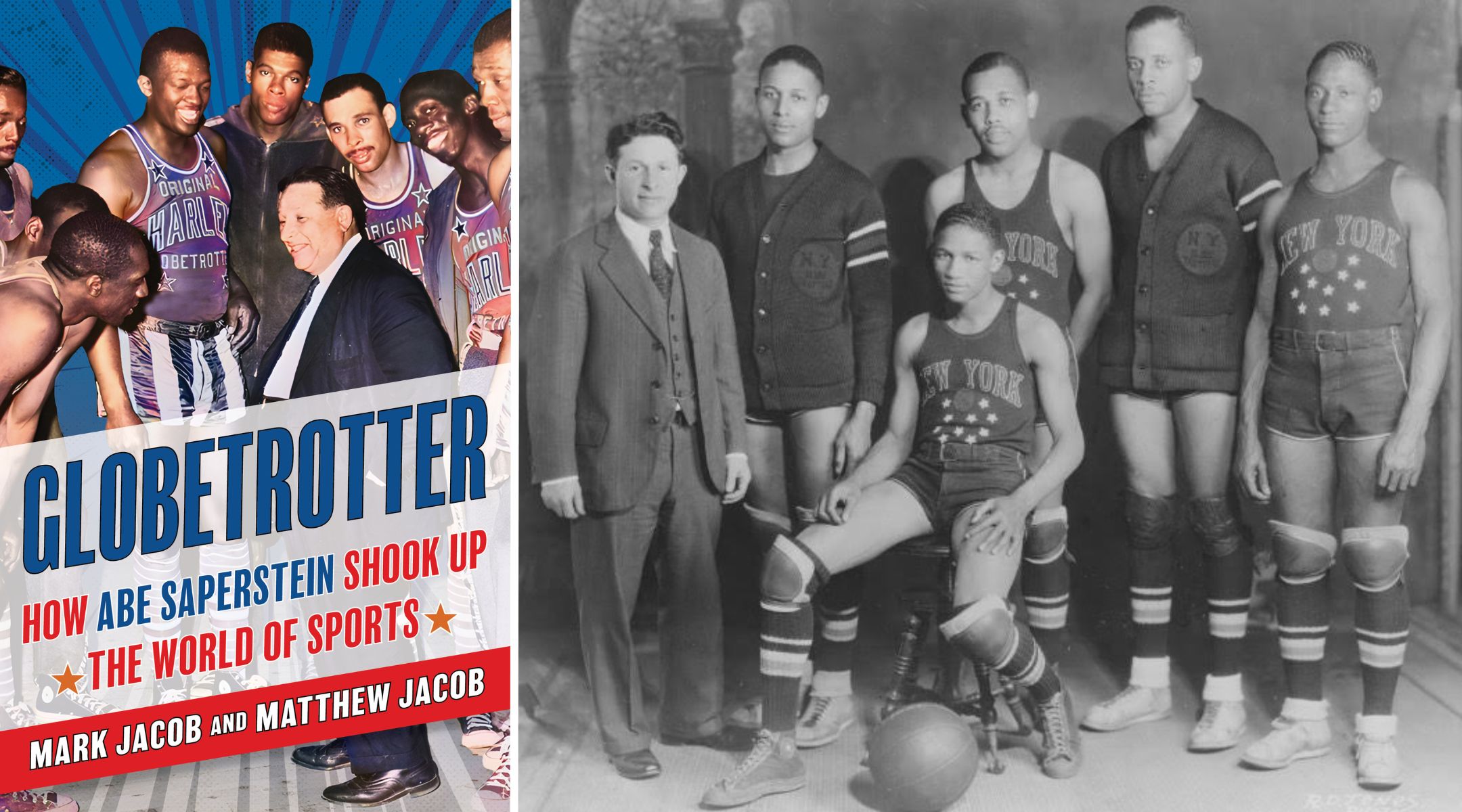When basketball superstar Stephen Curry sunk a series of three-point shots to help Team USA clinch the Olympic gold medal in Paris this summer, it’s unlikely the four-time NBA champion was thinking about Abe Saperstein.
But as a new biography of the trailblazing Jewish basketball executive suggests, Curry had plenty of reasons to be grateful to Saperstein, who is best known as the founder and longtime head coach of the Harlem Globetrotters.
Saperstein, who at 5-foot-3 is the shortest man in the Naismith Memorial Basketball Hall of Fame, is credited with introducing the three-pointer to the game. But his imprint on basketball, and sports more broadly, extends far beyond Curry’s signature long-distance shot.
In a new book, “Globetrotter: How Abe Saperstein Shook Up the World of Sports,” brothers Mark and Matthew Jacob explore Saperstein’s far-reaching legacy, which they say is still under-appreciated 58 years after his death. In addition to the three-pointer, they contend, Saperstein played a crucial role in elevating basketball from a second-tier American sport to a professionalized global powerhouse.
“You look at how popular basketball is in the Olympics, and Abe gets the credit for part of that,” Mark Jacob told the Jewish Telegraphic Agency. “I think that he should be considered one of the great innovators in sports, and not just in sports and how it was played — although he was that — but also in how sports was marketed and how it was promoted.”
Among his career highlights: He pushed the NBA to expand to the West Coast years before the Minneapolis Lakers moved to Los Angeles in 1960. And as early as the 1950s and ’60s, Saperstein warned about the slow pace of play in baseball, a live issue in MLB debates in recent years, and urged team owners to charge more for games against better teams.
“I think if Abe Saperstein, figuratively speaking, could be looking down from heaven, he would be smiling to see that the NBA doesn’t just have an All-Star Game, they have an All-Star Weekend with the slam dunk contest,” said Matthew Jacob. “He was just a great advocate for fans, and he wanted sports and sports teams to constantly reassess how they were operating, to put fans first.”
“Globetrotter,” which hit shelves this week, is the result of years of research and writing by the Jacobs. Mark, 69, lives in Evanston, Illinois, and is a former editor at the Chicago Tribune; Matthew, 61, lives in Arlington, Virginia, and is a member of the Society for American Baseball Research, the group credited with revolutionizing that game through analytics. (The brothers are not Jewish.) This is the second book they have co-written, following their 2010 work “What the Great Ate: A Curious History of Food and Fame,” and the most in-depth published examination of Saperstein’s life and influence.

“Globetrotter’ authors Mark Jacob, left, and Matthew Jacob. (Courtesy)
Saperstein was born on July 4, 1902, in London to Louis and Anna Saperstein, who had left what is now Poland amid a rise in antisemitism. The family moved to Chicago when Abe was 5. The Sapersteins were Conservative Jews who attended High Holiday services and spoke Yiddish at home but were largely secular.
Saperstein’s career in sports began as a booking agent, and in 1926 he became the coach of an all-Black team then called the Savoy Big Five, based on the South Side of Chicago. Saperstein renamed the team and began a barnstorming tour that, nearly a century and thousands of games later, the Globetrotters are still on.
At its inception, the team was neither from Harlem, nor were they globetrotters. The name was a symbol of Saperstein’s promotional flair: “Harlem” was chosen to signal to Midwestern towns of that era that the team was all-Black, and “Globetrotters” was meant to exaggerate the team’s reach and prestige.
The Globetrotters’ famous style of play — an entertaining combination of impressive athleticism, comedy and theatrics — has earned the team, and its founder, both celebration and consternation. While the Globetrotters are credited with elevating players such as Nat “Sweetwater” Clifton — who was one of the first Black players in the NBA — and future Hall of Famer Wilt Chamberlain, the team also took heat for what some considered to be playing into racist stereotypes.
“I think that some viewed the Globetrotters as kind of a minstrel show, as something that depicted Black people as childlike and pranksters and not as serious people,” said Mark Jacob.
But Jacob said the Globetrotters, and Saperstein, were far more nuanced than the team’s sometimes circus-like style would suggest. There was a reason Black icons including Jesse Owens and Jesse Jackson were fans.
“On the other hand, the Globetrotter players are conspiring with the audience to make fun of the referees and the other team,” Jacob added. “They’re not being demeaned. They’re almost triumphing in the whole pantomime of it.”
And while the players performed plenty of tricks on the court, they were also remarkably talented basketball players. In 1948, the Globetrotters won an exhibition game against the vaunted Minneapolis Lakers, who won three consecutive national championships from 1948 to 1950 in the NBA and its predecessor leagues.
“That showed that Black athletes could compete with anyone, at a time when a lot of white people didn’t think that was true,” said Mark Jacob. “A lot of people point to that game as a real impetus for the integration [of the NBA] and making it, in fact, inevitable that Black players would be allowed in the NBA because they could prove they could play.”
It was Saperstein’s identity as an outsider — a Jewish immigrant from London — that helped him take on the role of a go-between for his Black players and the still mostly white world of professional sports. Mark Jacob said Saperstein fits into broader Jewish-Black relations in the period, when Jewish leaders played a key role in the fight for Black civil rights.
Saperstein, a proud Jew and Zionist, was also no stranger to discrimination himself.
As “Globetrotter” details, Saperstein and his family faced antisemitism time and again, in London, in Chicago and as Saperstein traveled the world promoting his Globetrotters, Negro League baseball teams and other Black athletes.
Saperstein’s Jewish identity was especially front and center during the Globetrotters’ first European tour in 1950. When the Globetrotters went to Paris, Saperstein was vocal about his disdain for a particular venue, the Palais des Sports, where just years earlier 30,000 Jews had been held before being deported to Nazi camps.
“When you get down in those dark, gloomy dressing rooms, there’s a ghost around every corner,” Saperstein said of the Palais, according to the biography.
Saperstein and his 13-year-old daughter Eloise also encountered the deep-seated antisemitism of postwar Germany, according to a particularly powerful anecdote from the book recounted by Abra Berkley, Eloise’s daughter.
While her father conducted a news conference at a hotel, Eloise, in search of local Jewish food, went to the concierge to ask where she could find the Jewish neighborhood.
As Berkley recounted, the hotel worker spat in Eloise’s face and told her, “Hitler should have gotten rid of all of you.” Eloise, with spit still dripping down her face, burst into her father’s news conference, crying hysterically, and told him what happened.
Saperstein abruptly ended the conference, demanded the employee be fired, and went to a jeweler next door to order a Star of David necklace for Eloise, which Berkley said her mother never took off. Years later, Eloise made copies of the pendant for her own daughters.
“The fact that Abe went off and had that made right after that incident is just a very powerful message, not only to people today, but obviously to his daughter, who’s just gone through this very horrible experience,” said Matthew Jacob. “He is like, ‘This is who we are, and we’re going to be proud of it, and I don’t ever want you to forget it, because I won’t.’”
The scene, Mark Jacob said, exemplifies the audacity that animated Saperstein’s entire career, in which he was never afraid to speak his mind, even when some of his ideas were decades ahead of their time.
“Jews have historically faced horrible challenges and discrimination,” said Mark Jacob. “I think that there’s this kind of endurance, this ability to rise above circumstances and to meet challenges instead of avoiding them. And Abe was that. Abe did that.”
JTA has documented Jewish history in real-time for over a century. Keep our journalism strong by joining us in supporting independent, award-winning reporting.





